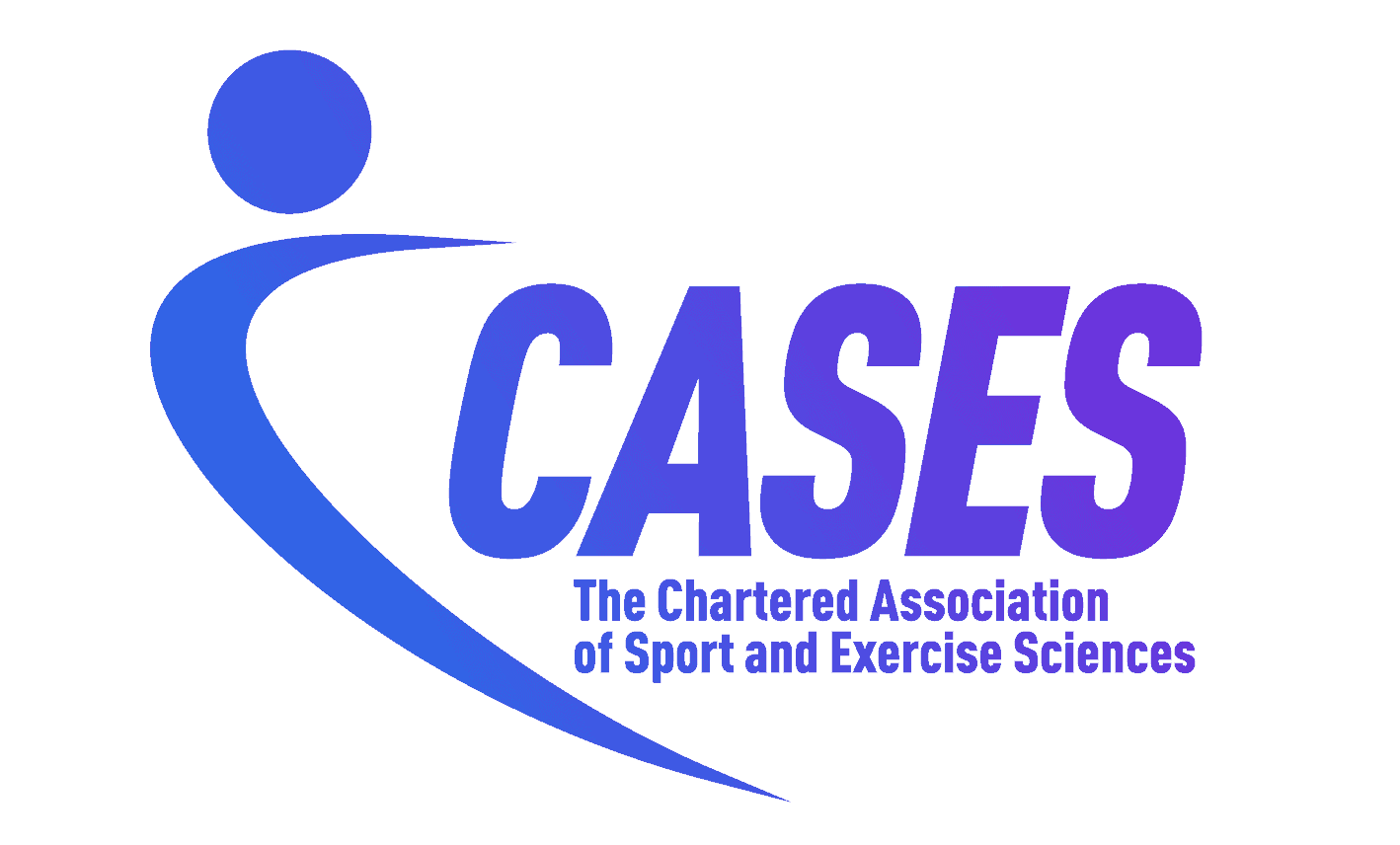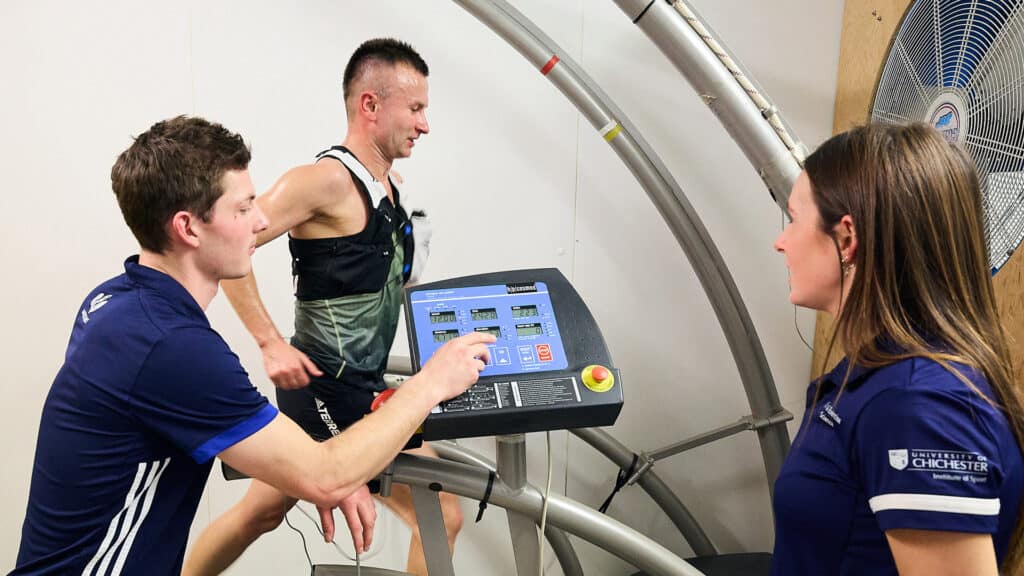Overview
Focus on the development of skills for practical application in both sporting and exercise populations
This programme has a strong focus on the development of skills for practical application in both sporting and exercise populations and provides you with the opportunity to develop an in-depth knowledge base of the physiological and metabolic demands of exercise and physical training.
In addition, it allows you to enhance and strengthen your practical skills in exercise physiology measurements and research methods, as well as developing your professional qualities.
The MSc in Sport and Exercise Physiology provides you with an opportunity to study at a postgraduate level to fulfil the initial requirements for accreditation by The Chartered Association of Sport and Exercise Sciences (CASES).

The Course
Understand the exercise physiology of leading sporting and exercise performance
This course provides you with the knowledge of advanced exercise physiology principles and theories, and enhances your practical skills as you build towards your final research project or supervised experience portfolio.
Whole Body Metabolism: Measurement and Application in Exercise Physiology
This module examines the application of whole-body metabolism to a variety of contexts within sport and exercise physiology ranging from elite sporting performance to clinical settings. Existing knowledge will be challenged through critical evaluation of relevant peer reviewed publications. Additionally, through a theoretical and practical evaluation of measurement techniques available in the area of whole-body metabolism, an appreciation will be given to validity and reliability of methodological approaches.
Research Methods for Exercise and Public Health
This is an introduction to quantitative and qualitative methodology for exercise and health using practical and real-world examples to illustrate how we make sense of data.
Muscle Physiology for Sport Exercise and Nutrition
An understanding of the role of skeletal muscles for whole-body physiological functioning exercise is essential when examining the impact of nutrition and physical training for sports for performance.
This module develops critical knowledge of muscle function and energy demands, the use of carbohydrate, lipids and proteins as energy sources, the metabolic pathways, the nature of metabolic limitations in skeletal muscles during exercise, the role of nutrition and ergogenic aids (e.g. polyphenols, carbohydrates, beta-alanine, creatine) for optimal function of skeletal muscles during exercise, the role of proteins for muscle mass and the relationships between nutritional interventions, signalling pathways and training adaptations in skeletal muscle.
The application of this knowledge to athletic training and sport with divergent exercise intensity and exercise demands will be discussed within both theoretical and practical contexts.
Applied Techniques in Exercise Physiology and Nutrition
This is a hands-on module that advances the skills required to undertake physiological assessments linked to client population requirements.
Professional Skills in Sport and Exercise Physiology & Nutrition
This module develops your knowledge base associated with applied physiological and nutritional support in a range of different environments including exercise testing, physiological and dietary measurement, food safety and hygiene and UK Anti-Doping (UKAD) considerations.
Specifically, the module will address the interplay between external physical challenges associated with different environments; internal physiological and metabolic challenges associated with gender, training status and various states of disease-impaired or compromised function such as musculoskeletal injuries.
Whilst the module gives due consideration to elite sports performance and recreational exercise participation, the module also discusses exercise and physical performance in occupational settings such as the military and emergency services.
A focus of the module is to critically discuss how sport and exercise scientists working in interdisciplinary teams can enhance performance, protection and promote safety and wellbeing.
Planning Your Dissertation/Supervised Experience Portfolio
The MSc Research Dissertation and MSc Supervised Experience Portfolio requires meticulous planning and preparation.
The primary aim of the module is to allow you to develop the rationale for the research question, aims, objectives and the rigorous and detailed methodology for the MSc Research Dissertation or MSc Supervised Experience Portfolio.
This module is a requirement to allow registration for undertaking the MSc Research Dissertation or MSc Supervised Experience Portfolio.
Supervised Experience Portfolio
This module provides you with the opportunity to plan, implement and evaluate discipline-specific sport and/or exercise science support within a real-life setting. You will gain insight into applied sport and exercise science, and prepare for the type of reflective and academically-grounded experience that is a central demand of candidates seeking Support Accreditation via BASES. The module has been designed to provide the opportunity for you to learn and develop in a real world setting whilst having access to identified support and training mechanisms.
The Research Dissertation
This module is the culmination of previous learning and is the major element of your independent enquiry on your programme. The module requires that you reflect on, and utilise the knowledge base, context, and application of taught modules, as well as placement experiences. It is designed to encourage you to generate and explore your own ‘problem’ assisted by supervision from a tutor.
Experience
Discover a wide range of excellent sporting facilities that support your learning
Sports laboratories
We have four specialist sports labs including a virtual reality reader, brain imaging unit and an observation suite.
Sports injury clinic
Students use our specialist injury clinics these spaces for practical sessions and run a practice.
Tudor Hale Centre for Sport
Our world-class Tudor Hale Centre for Sport acts as the focus for sports science, therapy and physiology.
Sports hall
Our specialist sports hall can be used for a wide range of indoor sports, including basketball, netball, badminton and volleyball.
Specialist outdoor sports pitches
Alongside our grass football and rugby pitches, we also have our International Hockey Federation compliant floodlit astro turf.
Close community
Our commitment to a friendly and close-knit student community contributes to a high degree of success for our graduates.
Expert staff
Learn from experienced sport and exercise science specialists here to support you throughout your degree.
FA Women's High-Performance Football Centre
As one of only nine centres in the UK, we provide additional opportunities for women to develop as players and coaches.
Fitness suite
We offer a variety of cardio, resistance and weight equipment, with a dedicated strength and conditioning room.
Sports Dome
The Sports Dome is a large indoor facility which can be used for sports such as cricket, football, hockey and many more.
Learning Resource Centre
The Learning Resource Centre (LRC) contains the library, a café, IT/teaching rooms and the Support and Information Zone (SIZ).
Library
Our campus library holds more than 200,000 books and over 500,000 eBooks.
Subject specific librarians
If you have difficulty finding material for an essay, seminar or project, subject librarians will be happy to provide assistance.
Teaching and Assessment
Innovative teaching methods that focus on practice
Teaching
Our team of academics ensure innovation, enthusiasm and expertise combine to deliver the excellent standards that give our institution its high reputation.
When you come to Chichester, you will join a community of students and lecturers working in partnership to ensure that your learning experience reflects best practice and embraces the opportunities presented by new, interactive technologies.
Each module is delivered differently depending on its content and focus of study.
In most modules you can expect lead lectures to introduce core content, but the majority of your time will be spent working in small groups with tutor support in seminars, workshops and laboratory sessions.
Many sessions will require you to have completed some preparatory work and you will also be given structured follow-up work after a session to further progress your learning, often reading or an individual/group task. As you progress through your degree you will be expected to take more and more ownership over your learning and development, directing your study into areas of most interest to you.
Assessment
You will be assessed by a variety of methods, including essays, examinations, portfolios, practical assessments, lab reports and oral presentations.
Our course includes a mix of assessments so that you may develop a wide range of transferable skills. Modules are assessed at every stage of the course, offering cumulative assessment of your progress.
You can monitor your own progress, allowing you the opportunity to discuss and plan your development with your lecturers throughout the course. Where appropriate, special arrangements can be made for students with an identified need.
- To gain a Postgraduate Certificate in Sport and Exercise Physiology, you need to complete three modules.
- To gain a Postgraduate Diploma in Sport and Exercise Physiology, you need to complete six modules.
- To gain an MSc in Sport and Exercise Physiology, you need to complete six modules, and a research dissertation or a supervised experience portfolio.
Careers
Acquire the skills and knowledge required to gain employment in sports, exercise or health industries
The experience and skills gained during your MSc Sport and Exercise Physiology allows you to start a career in many areas of sport, exercise and health.
Students have gone on to work in the health care sector, national governing bodies for sports, sports-related industry, private sports clubs and fitness centres, teaching in further and higher education or continued to pursue a PhD in a related field.
Typical careers include:
- Fitness consultant
- Athletic trainer
- Laboratory technician
- Sport science support personnel
- Sport equipment consultant
- Exercise prescription on GP referral schemes
- PhD research.
Course Costs
Course Fees 2025/26
UK fee
International fee
For further details about fees, please see our Tuition Fees page.
For further details about international scholarships, please see our Scholarships page.
To find out about any additional costs on this course, please see our Additional Costs page.
Entry Requirements
- An honours degree at 2:1 or higher in a related discipline.
- You will also be required to attend an interview.
If English is not your first language then English language proficiency required is IELTS 6.5 (with no element less than 5.5) – or equivalent qualification
International students who don't meet the entry requirements
If you are an international student and do not yet meet the entry criteria for this course, you may be eligible for our International Premaster’s Programme. This is a one-semester programme that allows you to progress onto a master’s course at the University of Chichester.



